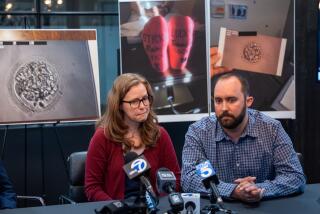Workers’ IBM Case Heading to Jury
- Share via
Jurors in Santa Clara will begin deliberating this week whether to hold IBM Corp. responsible for the cancers developed by two former employees who handled chemicals at the company’s plant in San Jose.
James Moore and Alida Hernandez are the first of more than 200 plaintiffs to argue in court that exposure to trichloroethylene, sulfuric acid, benzene and other chemicals at IBM’s hard disk drive and chip-making factories gave them cancer and caused their children to be born with birth defects.
Attorneys for the former employees will give their closing arguments in the 5-year-old case today, followed by IBM’s summation Tuesday.
When it comes, the verdict in Santa Clara Superior Court could have enormous implications for IBM and other high-tech manufacturers. The next trial against Big Blue is set to get underway next month in New York.
In the Santa Clara case, Moore blames IBM for his non-Hodgkin’s lymphoma, which was diagnosed in 1995. In his more than 20 years making components at the company’s disk drive plant in San Jose, he says, he complained of symptoms including headaches, blurred vision and blackouts.
Hernandez, who started at the same facility in 1977 and worked there more than a dozen years, was diagnosed with breast cancer in 1993. She said she routinely used benzene, acetone, xylene and other chemicals, often splashing herself as she coated surfaces or cleaned them. Hernandez said she suffered headaches and blackouts; she also had abnormal liver-function test results.
Because of workers’ compensation laws, the plaintiffs can’t win at trial merely by showing the chemicals caused their illnesses -- a claim IBM has strenuously contested. They must also show that IBM knew they were being harmed and deliberately withheld that information.
IBM attorney Bob Weber will argue that the parade of witnesses who testified on behalf of Moore and Hernandez during the four-month trial came up short of that burden of proof.
The testimony “didn’t prove that the illnesses were caused by their work. They didn’t prove IBM knew it. And they didn’t prove that IBM fraudulently concealed it,” Weber said in an interview last week.
Weber said Hernandez was repeatedly warned by IBM about the abnormal liver test results, which could have been caused by diabetes.
Moore’s chief symptom was nasal discharge, which Weber said “somehow set off a chain of events that resulted in cancer 30 years later.”
Scientists called to the stand were at odds over whether acetone and other chemicals could have caused the plaintiffs’ health problems.
In support of the plaintiffs, former IBM nurse Audrey Crouch testified that when a worker complained of health problems, the unwritten corporate policy was to look for other causes.
“You look for alternative explanations, and as soon as you find one, that’s it,” said Amanda Hawes, an attorney representing the sick workers.
Crouch was undercut on cross-examination when she was shown correspondence in which IBM’s medical staff disclosed Hernandez’s history of exposure to chemicals to the worker’s outside specialist.
Studies based on federal labor statistics show illnesses among chip workers to be two to three times more common than among all workers, said Joseph LaDou, a UC San Francisco professor and editor of the International Journal of Occupational and Environmental Health.
Those studies include non-production workers such as engineers and sales staff, and they don’t distinguish between cancer and minor sickness. A few other studies turned up significant increases in brain tumors, but those studies were too small to be considered reliable, LaDou said before the trial.
“The balance of evidence to date is that there’s clearly a reproductive problem, and that alerts us to the possibility of a birth defect problem,” LaDou said. “In the long run, that suggests it would also be a cancer problem.”
Better studies would require data from manufacturers, but they have refused to cooperate with federally funded efforts to pin down which types of workers died from specific cancers and at what age.
IBM has collected a trove of information on the health of its workers, including 30,000 death records. Santa Clara Superior Court Judge Robert Baines refused to admit into evidence a study offered by an expert for the plaintiffs that was based on those records.






